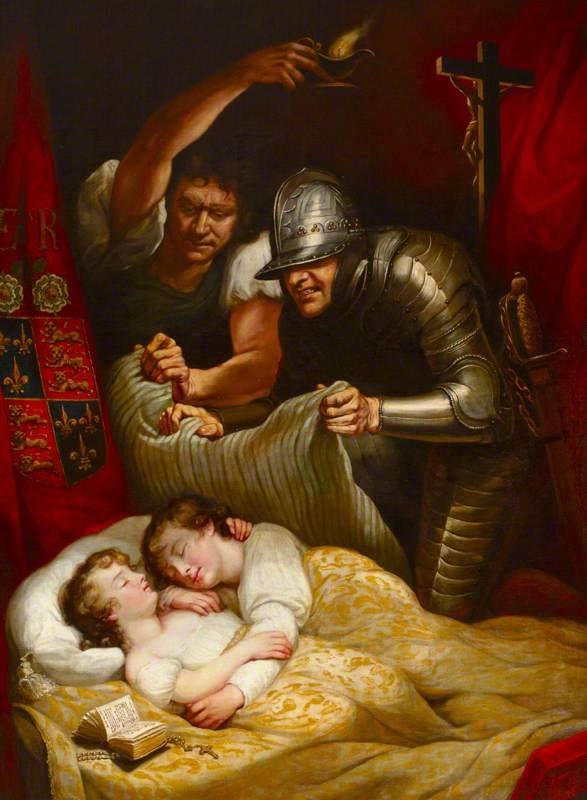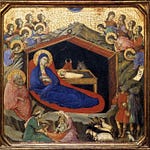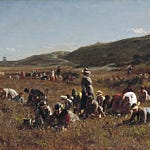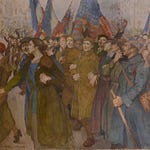I’ve long told my students that there are a couple of sins that Shakespeare never fails to punish, severely, and one of them is cruelty to a child — our Word of the Week. But when I think of it a little more, it strikes me that no other playwright in Shakespeare’s time was anywhere near as fond of putting children on stage, as children (I’m not talking about the boys who played the women’s parts, before their voices changed), and not just as pretty decorations, but as central to the action. There’s the boy-prince Arthur in King John who warms the heart of Hubert, who has been set on by the wicked and weakling king to put the innocent lad to death. There are the two young princes in Richard III, who dominate the scene they share with the scheming Richard and his tool, Buckingham, and dominate it not only by their youth but by their grace and high-mindedness. There’s the small boy Mamillius in The Winter’s Tale, the only person we see in the first and tragic half of that play who is loved by both his mother and his jealous and irrational father.
Then there are, in Shakespeare, other children besides the children. And that’s exactly right. Our greatest poet, like our greatest novelist (Dickens), never forgot the words of Jesus, that unless we become like little children, we shall not enter the kingdom of heaven. King Lear wants to toss away his due burden as king and as the father of his people, that he may “crawl unburthened toward death.” When his youngest daughter, Cordelia, the only one of the three daughters who really loves him, declines to play his game of flattery-for-pay, he disowns her, and says he had thought to set his rest “on her kind nursery.” The irony is that, in disowning her and in banishing the loyal earl of Kent for taking her part, Lear is behaving like a childish and arbitrary tyrant, self-willed and spoiled. He must become childlike through suffering and penitence. When Cordelia comes back into England to save him from her cruel sisters, he is not in his right wits — or he is both a madman and a wise man at the same time. When they finally get Lear out of the meadows and under a dry roof, with the care of a good physician, Cordelia prays:
O you kind gods, Cure this great breach in his abused nature! The untuned and jarring senses, O, wind up Of this child-changed father.
She means that he’s fallen into a senile childhood, but her words suggest more than she’s aware of. Lear will become like a little child, as the gospels mean it, and when he is so, he will perform his most fatherly and loving action in the play.
I enjoy the company of children, and always have, just as I’ve always enjoyed the company of the very old. People my own age — well, that’s another matter! When I was a small boy, the old ladies on our dead-end street would sit on their front porches and chatter with one another, while in a general way they observed our games, and all was right with the world. As I got a little older, I could roam the streets and the woods with the other kids, and we were like the beating heart of a real and human neighborhood. For even grownups find it hard to be surly and aloof when children are swarming among them. Hard, but not impossible. One family with three boys moved in near us, and when one of the neighborhood mothers brought over a pie to welcome them, she was informed by the wife that they wanted to keep to themselves and not have anything to do with anybody. Those three boys played in their own yard and nowhere else. I never even got to know their first names. Their parents were not like children, and so they robbed their children of a real child-life.
Our word child doesn’t appear to have any relations outside of the German languages. It isn’t related to German Kinder or to English kin. For a while, in certain English dialects, it could refer specifically to a girl: so the shepherd in The Winter’s Tale, finding an abandoned baby on the shore, says, “A boy or a child, I wonder?” Also for a while, it could refer to a young knight: “Child Roland to the dark tower came,” says the Fool in King Lear, as repeating a snatch of a nursery rhyme. The plural children developed in the Middle Ages, from an earlier plural cildru, rather like German plurals in -er. That kind of plural in English was rare, though, so people felt they needed another sign of the plural, and that’s how cildru became children, a double plural, like shoeses. The old plural survives in Childermas, which was the name for the Feast of the Holy Innocents (December 28). And what do you think the cildhama named, in Old English — the child-home? The mother’s womb: a beautiful word for a warm and welcoming place.













